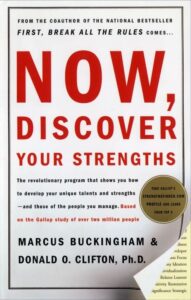Your cart is currently empty!
Helping Teenagers Succeed

With all that teenagers are bombarded with these days, plus all the activity and curricular opportunities, it’s critical for parents to have access to constructive resources that encourage them in raising their children.
Add to this the importance of creating safety for their questioning spirits—their enormous curiosity about life—helping them develop and explore their own inner landscape can anchor and nourish them.
Why Focus on Strengths?
 In their book, Now Discover Your Strengths, Marcus Buckingham and Donald Clifton have created a program to help readers identify their talents, build them into strengths, and enjoy consistent performance.
In their book, Now Discover Your Strengths, Marcus Buckingham and Donald Clifton have created a program to help readers identify their talents, build them into strengths, and enjoy consistent performance.
Unfortunately, most teenagers have little sense of their talents and strengths, much less the ability to build their lives around them. Instead, guided by us, by teachers, and by psychology’s fascination with pathology, they are encouraged to identify, analyze, and correct their weaknesses in order to become strong.
Best Quotes
“This advice is well intended but misguided. Faults and failings deserve study, but they reveal little about strengths. Strengths have their own patterns. To help your teenager excel in his or her chosen field and find lasting satisfaction in doing so, they will need to understand their unique patterns. You will want them to become expert at finding and describing and applying and practicing and refining their strengths.”
“By defining strength as consistent, near perfect performance in an activity, there are three important principles of living a strong life: First, for an activity to be a strength your teen must be able to do it consistently. The acid test of a strength? The ability to fathom themselves doing it repeatedly, happily, and successfully.
“Second, they don’t have to have strength in every aspect of their role in order to excel. They do not have to be well-rounded. Third, they will excel by maximizing their strengths, never by fixing their weaknesses. This is not saying, ‘ignore your weaknesses.’ Instead, help your teen find ways around their weaknesses, thereby freeing them up to hone their strengths to a sharper point.”
Counteract Learned Helplessness
 In her book, How to Father a Successful Daughter, Nicky Marone suggests that “there are all kinds of parents. Some get locked into a particular kind of message that puts pressure on a daughter to conform to the stereotypical role of learned helplessness.
In her book, How to Father a Successful Daughter, Nicky Marone suggests that “there are all kinds of parents. Some get locked into a particular kind of message that puts pressure on a daughter to conform to the stereotypical role of learned helplessness.
The following questions help raise our consciousness so we can begin to understand the complexity of the forces that act on females and affect their lives significantly.
- Do I encourage my daughter to explore her environment, seek new experiences, and challenge her physical limits? In other words, do I encourage her to take risks?
- Am I inclined to rescue my daughter whenever she becomes frustrated or upset? Do I hover, ever watchful to ensure her comfort and security?
- Have I ever shown my daughter how to defend herself or enrolled her in a self-defense course?
- Do I accept “I’m scared” or “I don’t want to” as a legitimate justification for avoiding a challenge? (Would you accept this justification from a son?)
Premature Rescuing
“Because of realistic fears concerning their safety, we train girls to be careful and cautious. We do this out of love, and love can make mistakes.
“When we rescue prematurely or protect too aggressively, we send a powerful message: “You can’t do this alone. You need help.
“The result of this training is that girls become fearful and dependent. They rarely get the opportunity to experience the sheer exhilaration of a risk successfully negotiated.
“Consequently, girls are often cheated out of the growth and self-knowledge that come from pushing beyond one’s comfort zone.
“When interacting with daughters, fathers displayed a curious behavior which they did not display with sons. They would pick up the puzzle piece and put it in place for the daughter —before she requested help.
“This [often unconscious] type of behavior, obviously motivated by love and a desire to protect, has devastating effects. Ultimately, it produces a type of behavior called “learned helplessness.
“The theory of learned helplessness is aptly conveyed in the label itself. It states that given the right conditions, individuals learn to be helpless. In other words, the helplessness, which many females exhibit is not a feminine trait, but rather one that has been taught and reinforced. One of the vehicles for teaching learned helplessness is premature rescuing.
“The unspoken message says, “You are not capable of doing this by yourself. You need help.” Females receive this message much more frequently than do males.
“With males, we allow them to experiment in order to build character and test their limitations. We do not offer females the same luxury. Instead, by rescuing them, we cripple them.
“Unfortunately, in a father’s overly zealous desire to protect his little girl from risk and the discomfort of anxiety-provoking situations, he tells her that she is incapable, incompetent, and in need of help. His behavior sends the message that that is what he thinks of her, so she comes to believe it herself.
“Always wait until your daughter requests help. Even then, you may decide it is in her best interest to withhold assistance a little longer. Never, never give help before it is requested. Stop and think, ‘How many times in my adult life has anyone barged in to rescue me before I requested it?’
“Since it is adult life you are preparing her for, the answer is self-evident. Unless it is an emergency situation, pause and ask yourself, “Would I rescue her from this situation if she were a boy?”
“With every risk successfully negotiated comes an equal and proportionate surge of confidence and vitality. In a way, one is almost ensured of success whenever one takes a risk because the act of taking the risk in the first place is a positive self-assessment and a boost to self-esteem, even if one fails at the undertaking! Not to try is the ultimate failure.
“Safety and security are dead ends. They do not foster personal growth, they do not encourage development of one’s coping skills, they do not inspire one to push beyond one’s comfort zone.
Motivate Boys to Learn
 In his book, Boys Adrift, Leonard Sax highlights several disturbing trends influencing growing boys. He draws on the scientific literature and his more than 25 years of clinical experience to explain why boys and young men are failing in school and disengaged at home.
In his book, Boys Adrift, Leonard Sax highlights several disturbing trends influencing growing boys. He draws on the scientific literature and his more than 25 years of clinical experience to explain why boys and young men are failing in school and disengaged at home.
Best Quotes
“Many kids who are being diagnosed with ADD/ADHD today are misdiagnosed. They’re not paying attention, true, but their deficit of attention isn’t due to ADHD, its due to a lack of motivation in the classroom.
“Those boys don’t need drugs. What they need, first is a curriculum that is developmentally appropriate, and second, teachers who knew how to teach boys.
“There are two kinds of knowledge: book learning and experiential learning. Kids need to experience the real world. Only the past decade have developmental psychologists come to recognize that a curriculum that emphasizes book learning at the expense of experiential learning is deficient.
“You can easily find high school students in America today who can tell you about the importance of the environment, the carbon cycle and the nitrogen cycle, and so on, but they’ve never spent a night outdoors. They have plenty of book learning but not a trace of experiential learning.
“For boys in particular, emphasizing book learning while ignoring experiential learning may seriously impair development—not cognitive development, but the development of a lively and passionate curiosity
“‘Nature is about smelling, hearing, tasting,’ Richard Louv reminds us. ‘The end result of a childhood with more time spent in front of computer screens than outdoors is what he calls cultural autism.’ If boys are deprived of that balance between book and experiential learning, they may simply disengage from school.
“What about video games? One key is balance. If time spent on video games is crowding out time spent with friends or time spent on homework, then your son is spending too much time on video games.
“Researchers find that the more time you spend playing video games, the more likely you are to develop difficulties maintaining sustained concentration on a single item.
“No one else can do this job for you. You must know what games your child is playing. There should be no expectation of privacy when your son is playing a video game.
“If your sons is going to a friend’s house to play video games, you must find out whether the parents share your concerns about violent video games. What rules should you lay down?
“Professor Anderson recommends first of all that you either play the game yourself or watch it being played.
Conclusion
These books provide numerous ideas for you to consider. It’s easiest to raise our teenagers on autopilot because we’re all so busy with so many things. It takes time to check out their video games and it takes awareness to notice when we’re rescuing them.
Time is what you have for a short eighteen years, and consciously deciding how to help your teenager discover their strengths, avoid premature rescuing—allow them to make mistakes and learn from them in order to develop self-reliance, and helping their balance their lives will, in the long run, help them become more successful in life.
